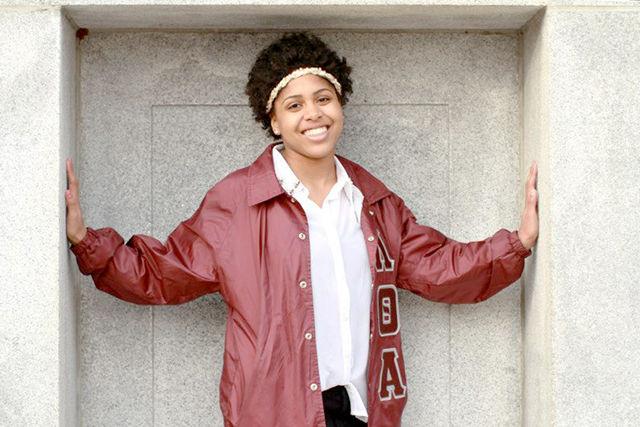 Ayanis Lindo, a junior studying zoology, has a complicated lineage in which she identifies as an Afrolatina woman. Though her heritage can cause problems in paperwork, it can also bring surprises to those who assume she is only one of her identifiable ethnicities. " />
Ayanis Lindo, a junior studying zoology, has a complicated lineage in which she identifies as an Afrolatina woman. Though her heritage can cause problems in paperwork, it can also bring surprises to those who assume she is only one of her identifiable ethnicities. " />
Contributed by Lambda Theta Alpha
Ayanis Lindo, a junior studying zoology, has a complicated lineage in which she identifies as an Afrolatina woman. Though her heritage can cause problems in paperwork, it can also bring surprises to those who assume she is only one of her identifiable ethnicities.
Ayanis Lindo, a junior studying zoology, has always had a complicated identity. Born in Panama to Panamanian parents, she lived there until she was three.
Friends describe her as a sweet girl with a fun and bubbly personality. She is short in stature, with large eyes and black hair. She confidently identifies as an Afro-Latina woman.
“On paperwork where I only have one option I always put Latina, but if I have the option to put both black and Latina, then I do,” Lindo says.
Growing up in Fayetteville in a subculture of African Americans, Lindo identifies strongly with both of her minority identities. She is bilingual in Spanish and English. Her parents both speak Spanish, but her father, raised by his Jamaican grandmother, also speaks English.
Lindo came from a predominantly black high school, so she didn’t feel the need to choose between her black and Latina identities growing up.
“I would surprise a lot of people because I could speak Spanish,” Lindo said.
She would often have to explain to others where she was actually from, and how both of her parents spoke Spanish. She says that she often encountered a lot of denial because people would look at her appearance and claim she wasn’t Hispanic. She still remembers a time when a friend told her, that her hair and skin looked black but her face looked exotic.
“People always assume I’m African American and stereotype me that way,” Lindo said. “Then people would tell me I wasn’t black, I could only be Panamanian even though I identify with both.”
As a senior in high school, Lindo was drawn to North Carolina A&T State University because it was a predominantly black school with a good program for pre-veterinary students. NC State’s Veterinary School, one of the strongest in the country; however, won her over.
“I really wanted to go to vet school and that’s why I chose this school,” Lindo said.
Coming to NC State from a predominantly black high school was quite a change, considering that NC State has a Latino population of four percent, a black population of 11 percent, and is considered a predominantly white institution, according to the Admissions website. Lindo was initially more involved in the Latino community because she felt that they would accept her more, but she found that something was missing.
“My sophomore year I became more involved in the African American community, and I felt very welcomed here,” Lindo said. “I get a sense of family from the Latino community but I also enjoy the traditions, food and dances of the African American community.”
Lindo also belongs to the Epsilon Nu chapter of Lambda Theta Alpha, Latin Sorority Inc., which is non-exclusionary.
“I have a very diverse group of sisters who are eager to learn about different cultures, and they represent a variety of cultures themselves,” Lindo said.
Lindo considers herself an advocate for the Latin and African American communities at NC State. She feels that both communities could benefit from further funding from the university for events that showcase culture. “The university should also do a better job of promoting cultural events to a larger population,” Lindo said.
While most events from the Multicultural Student Association are advertised through University Scholars as events for their students, Lindo believes that other organizations could benefit from sponsoring diverse events from the African American and Latino communities at State.
Despite her pride in her identities, Lindo wants others to know that she’s just a normal person. “I have a diverse love for knowledge and I really love to learn more about other cultures, especially Latin cultures and how different they are,” Lindo said.